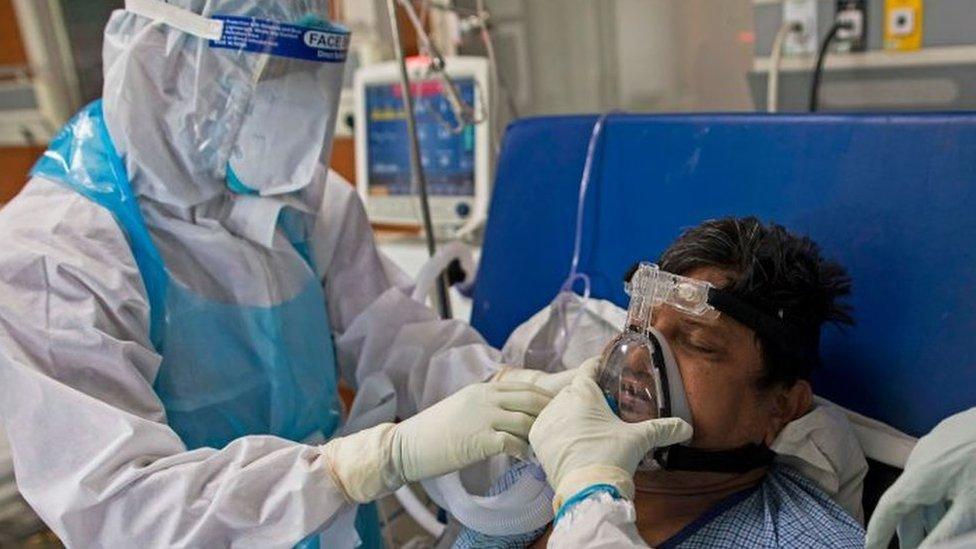India's Kumbh festival attracts big crowds amid devastating second Covid wave
- Published
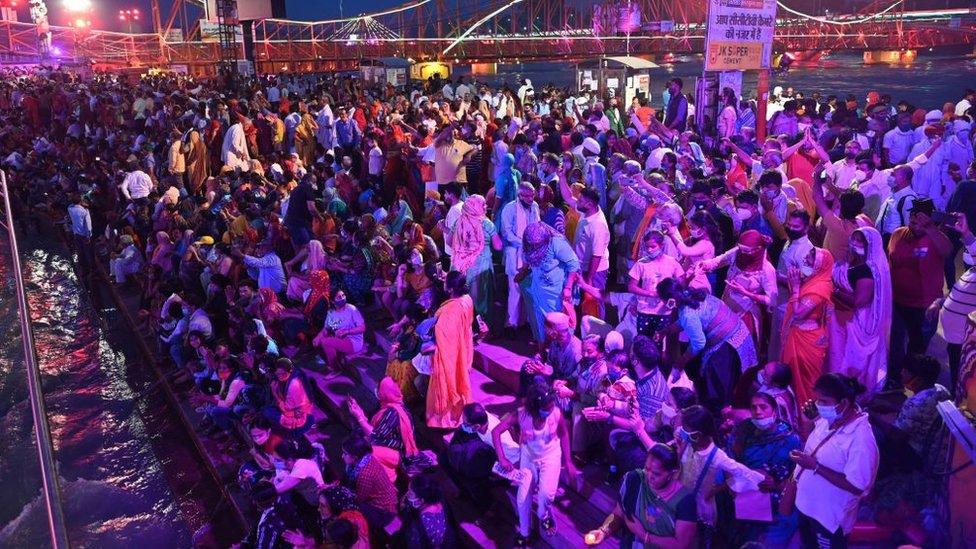
Millions have gathered for the Kumbh Mela festival despite a raging pandemic
This past week, as India grapples with a devastating second wave of the coronavirus, millions of devotees have descended on the banks of the Ganges river in the northern city of Haridwar to take a dip in the water.
Hindus believe the river is holy and taking a dip in it will cleanse them of their sins and bring salvation.
But the government of Uttarakhand state, where Haridwar is located, is facing heavy criticism for allowing the Kumbh Mela festival to go ahead amid a sharply worsening Covid picture. On Thursday, India reported more than 200,000 Covid cases for the first time since the pandemic began.
One influential Hindu congregation decided to opt out of the massive festival. "The Kumbh Mela is over for us," Ravindra Puri, secretary of the Niranjani Akhada or congregation was quoted as saying in local media, external.
The decision came a day after Swami Kapil Dev, the head of another prominent congregation, died after being diagnosed with Covid-19, external.
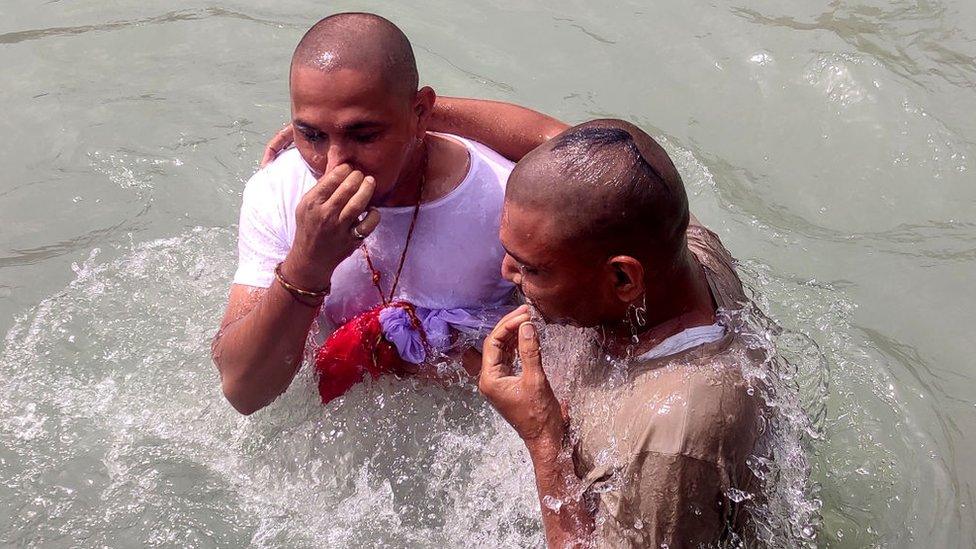
Millions have taken dip in the Ganges river as cases surge across India
It's unclear how many devotees at the Kumbh Mela have tested positive since the first day of bathing on 11 March. But Haridwar's chief medical officer, Dr SK Jha, said more than 1,600 cases had been confirmed among devotees between 10 and 14 April.
But there are fears that the numbers could be even higher, and that many of those who have returned home could have taken the disease with them across the country.
India has confirmed more than 14 million cases and 174,000 deaths from the virus so far. There had been a sharp drop in case numbers in January and February, but with cases and deaths now rising again, hospitals across the country are reporting a shortage of beds, oxygen cylinders and drugs.
The uptick in cases did not discourage people from attending the Kumbh Mela. Ujwal Puri, a 34-year-old businessman, arrived in Haridwar on March 9 armed with bottles of sanitiser, masks and vitamin pills.
Mr Puri expected stringent Covid security checks. But he told the BBC he faced no checks at the airport or in Haridwar. One of his photographs from the festival shows crowds at the banks, waiting to take a dip on one of the nights. Many people can be seen not wearing a mask or pulling it down to their chin.
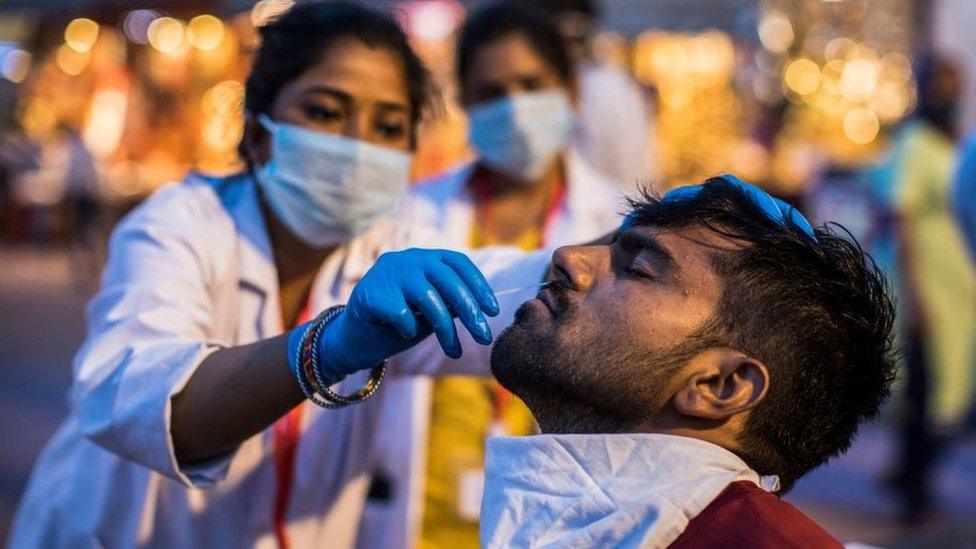
More than 1,800 devotees have tested positive in recent days
"There was no social distancing," Mr Puri said. "People were sitting cheek-by-jowl for the holy prayers in the evening."
He stayed at the festival for three days, he said, and took off his mask in public "only once to take a selfie with seers". "I left everything to God," he said.
When he returned to Mumbai, Mr Puri locked himself in a room, he said, and got himself tested. "I live with my parents so I took all the care I could."
But not everyone will have taken even these measures. There have been warnings that the Kumbh Mela could have functioned as super-spreader event.
"The Kumbh should have been postponed," said historian Gopal Bhardwaj. "Kumbh is meant to provide peace to the inner self. How would one find inner peace if your loved one is Covid-infected?"
Crowds at India's Kumbh Mela amid Covid wave
Others have disagreed. Raghavendra Das, a saint who is at the Kumbh Mela in Haridwar, said: "Are election rallies not super spreader events? Why are liquor shops open? Aren't they spreading coronavirus?"
That will provide little reassurance for those that live in Haridwar and fear that the influx of pilgrims has put them at risk of contracting the virus.
"These pilgrims return home in a day or two. But who knows what they left behind," said Mithilesh Sinha, a resident of Haridwar.
The fear of increased Covid risk prompted Sachdanand Dabral, another resident, to petition the court last year, asking to know how the state was prepared in case of a Covid surge. Mr Dabral blamed the Uttarakhand Chief Minister Tirath Singh Rawat for the rise in cases, for allowing people in to the state unchecked. The BBC was unable to reach Mr Rawat for comment.
Mr Dabral's lawer, Shiv Bhatt, was part of an official court-appointed committee that toured Haridwar in March to take stock of the preparations for the Kumbh Mela. Mr Bhatt said the hospitals, including a designated a Covid care centre, lacked basic amenities.
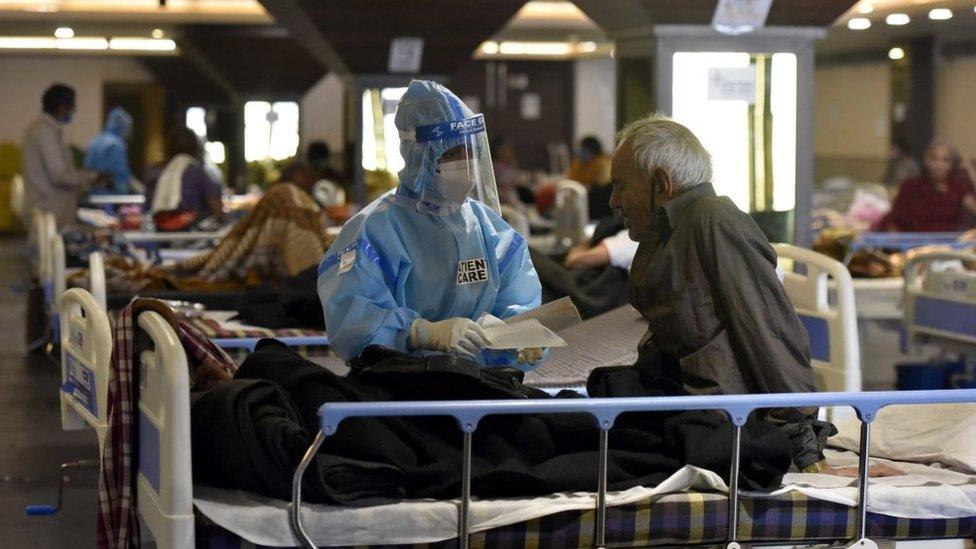
Cities from across India are reporting shortages of hospital beds, oxygen and life-saving drugs
"Washrooms and wards were in bad shape. There were no bed pans and dustbins. The lift was not working," he said.
But Mr Jha said all the issues that were raised in the committee's report had since been fixed. And devotees continue to throng the banks, often maskless and in close proximity even as officials struggle to enforce Covid safety rules in the festival.
Sandeep Shinde, a Mumbai-based painter, said he enjoyed his experience of the Kumbh Mela earlier this month. Housed in a large hall shared by about 10 devotees, Mr Shinde slept on a mattress on the floor.
"To come here and experience people taking a holy dip was beautiful. I didn't hear anyone around me talking of corona. No one was talking of the virus," he said.
- Published25 March 2021
- Published7 April 2021
